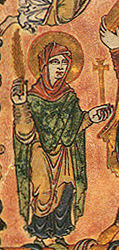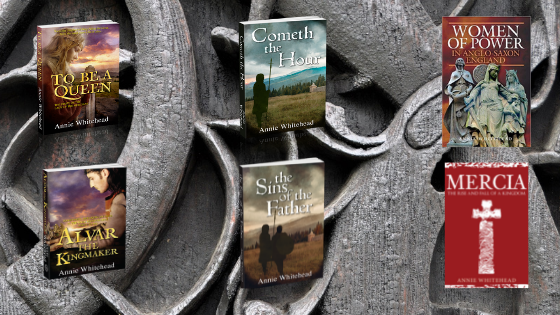Most of the documents I study were written by clerics, and usually about 'important' people - kings, heirs to the throne, wives and women of kings. Almost all of these are mentioned as part of the stories of clergymen, those venerated as saints.

But tucked away at the end of a huge book*, my go-to source book, in fact, I rediscovered this gem, a letter written to a 'brother Edward'. It's written in the vernacular, a rarity for this period, and if one reads it as if it's addressed to a family member, it takes on a surprisingly contemporary tone, even though it addresses concerns very specific to the time of the Danish invasions:
"I tell thee also, brother Edward, now that thou hast asked me, that you do wrong in abandoning the English practices which your fathers followed, and in loving the practices of heathen men who begrudge you life, and in so doing show by such evil habits that you despise your race and your ancestors, since in insult to them you dress in Danish fashion with bared necks and blinded eyes. I will say no more about that shameful mode of dress except what books tell us, that he will be accursed who follows heathen practices in his life and in so doing dishonour his own race."Elsewhere in the letter, the author asks Edward to try to stop 'a disgusting habit among women in rural districts, since he more often goes among these than does the writer'.
This made me smile. In fact there is so much that is wonderful about this missive, not least the opening line, "Now that thou has asked me..."
Is there a little bit of smugness, too, that it is only Edward who goes more often among women in rural districts? I note that the writer implies that he does occasionally venture there himself, but never so frequently as the wayward brother. And what is the 'disgusting habit'? We are not told. Is this because this letter was not written for posterity, but simply to a brother gone off the rails? One can almost hear the drawing of breath, the whisper, "You know exactly what I'm talking about."

Obviously written at the time of Danish invasion, this letter is a delight, not only for its rarity but because of the wonderful image it conjures up. One can imagine that Edward is mixing with the wrong crowd, has quite had his head turned by the fancy and trendy invaders and has taken, much to the author's, maybe his family's, consternation, to following this new fashion. The 'blinded eyes' does not refer to 'cool shades', but one feels it is the middle-ages equivalent.
Plus ca change...
*English Historical Documents Ed Dorothy Whitelock
Other related blog posts:
Anglo-Saxon Names
Wulfric Spott: A Mercian Man of Means

Hi, Annie! Thanks a lot for this interesting post. This letter is a part of a more ariculated document, commonly named 'De Sanguine', stigmatasing some bad habits of the English during the 9th c. One of these was to eat big quantities of food during festive dinners while sitting on the cesspit, maybe attempting to empty the guts continuously and to let in the biggest possible quantity of food (yuk!). I assume this is the peasant women's 'disgusting habit' the author mentions.
ReplyDeleteThanks Giovanni,
DeleteMy translation doesn't have the details of the 'disgusting habit' but you're right, this would be what the author is referring to - 'disgusting' is probably the right word to use!
How odd that both the blogs I follow about Anglo-Saxons should refer to the same passage of the same letter in the same week. I suspect Edward's poor brother would be bemused that people are still interested in what he wrote so long ago. I wonder if Edward took his advice.
ReplyDeleteYes, it was a complete coincidence - I saw the other post and thought 'how odd that we should be talking about the exact same letter.' Thanks to Giovanni (see above) I now have a lot more information about this letter, and there is a possibility that it was written by Aelfric, which puts a slightly different light on it. But I enjoy it for what it appears to be - a very stern and personal reproach. And my guess? Edward probably wasn't that chastened!
DeleteAppreciate this. I was suspecting that it was written by an older sibling, as one, I can just say it has that tone to it. ;-)
ReplyDeleteThanks Rod,
DeleteYes, it does, doesn't it? Very reproachful tone. I recognise it so well!
Such a Palfrey thing to concern himself with, whilst Aethelflaed doth the same
ReplyDelete